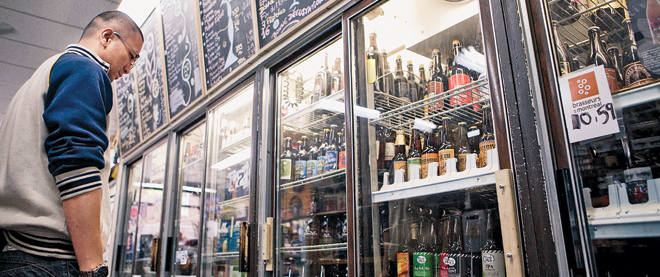Why is your government standing in the way of cheaper beer?
Nearly every province mandates minimum prices for the stuff
Share

Canadians find beer an endlessly interesting topic. We enjoy drinking it, brewing it, watching ads for it and even following the delivery of equipment used to make it. Consider, for example, the daily press coverage of the recent transportation of six massive beer fermenters, each seven metres high and capable of holding one million bottles of beer, to the Molson Coors brewery in Toronto. The $24-million operation required shutting down several highways and lifting 1,600 service wires: it also had its own logo, website and Twitter feed. Despite all this fermented fascination, however, there’s one aspect of beer in Canada that receives far too little attention: the fact that nearly every province mandates minimum prices for the stuff. These policies stifle competition and choice and force all Canadians to pay more than they should for their favourite alcoholic beverage.
The issue of minimum beer prices made a rare appearance in the news last week with reports that the Quebec Brewers Association is lobbying the provincial government for a bigger boost in the floor price of beer. Quebec’s minimum price is reviewed annually and adjusted for inflation. The brewers, however, are arguing beer prices should be hiked by more than the national consumer price index. At current rates, they warn, beer will soon be cheaper than milk. We can only hope.
Every province except Alberta mandates minimum retail prices for beer across a wide variety of categories. (Manitoba only mandates the price for single-serving cans.) Using a case of 24 bottles of light beer as comparator, minimum prices range from $26.55 in Quebec to $38.14 in Newfoundland. (In Alberta, tax hikes in 2009, and the fact of a monopoly distributor, has meant prices aren’t always lower than other provinces’ minimums. Still, retailers are free to put beer on sale, as it was in Calgary this week, where 24 Bowen Island Special Light could be had for $24, plus GST.) Most provinces also regulate the price of beer sold in bars. In Alberta, for example, the lowest legal price for beer in a bar is $2.75, or 16 cents per ounce for draft.
Minimum beer prices, or “social reference prices” as bureaucrats like to call them, are designed to keep Canadians at a distance from our own baser instincts by making beer too expensive to binge on wantonly. Whether such prohibitionist regulations are successful in preventing public drunkenness or excessive private drinking is open to considerable debate. Unfortunately, consumers appear to have no say in this matter. Politicians, lobby groups such as Mothers Against Drunk Driving and the big beer companies are all strong supporters of minimum prices.
While the Brewers Association of Canada frequently complains about federal and provincial taxes on beer (at 51 per cent of the average retail price, our beer taxes are among the highest in the world), it has no such qualms about minimum prices. Last year the organization’s president extolled the benefits of Canada’s floor prices to the Scottish legislature.
The brewers’ association claims it supports minimum prices as a damper on excessive drinking. And yet floor prices are also quite handy in preventing bothersome competition. In 2008, following an apparent request from the brewing industry, Ontario quietly moved its minimum price from $24 a case to $25.60, thus shutting down popular “buck a beer” promotions by cheaper brands. This is how beer price wars are avoided.
It is hard to escape the suspicion that increasing revenues is the real motivation behind the brewers’ support for social reference pricing. Consider the influential National Alcohol Strategy report from 2007. This document, assembled with input from government, addiction researchers and the beer industry, has a particular fascination with U-Brew operations. The report recommends that these do-it-yourself outlets be forced to charge the same minimum price per bottle as retail stores, which would amount to an enormous price increase. Raising U-Brew prices would do nothing to prevent spontaneous binge drinking—it takes several weeks to produce a drinkable product—but it would certainly reduce the competition faced by beer companies.
Problem drinking as a social issue already receives considerable government attention. A very high level of taxes boosts the price of beer and provides ample funds for necessary intervention efforts. From this perspective, minimum pricing laws are redundant and unnecessary. It’s impossible to raise beer prices sufficiently to discourage all under-aged drinking without punishing legal-age adults as well. And where there’s an identified problem with specific products, such as high-alcohol single-serving cans, Manitoba’s specific approach seems appropriate. Beyond this, if a beer maker or retailer wants to compete on price, why should the law say no?
Ultimately, minimum pricing punishes the vast majority of Canadians who enjoy their beer in an entirely responsible manner by reducing choice and raising cost. For a nation that loves its suds as much as Canada, that seems warm, flat and stale.